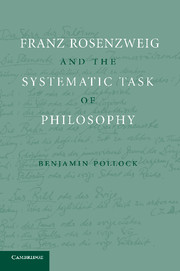Book contents
- Frontmatter
- Contents
- Acknowledgments
- Introduction: The Star of Redemption as “System of Philosophy”
- 1 System as Task of Philosophy: “The Oldest System-Program of German Idealism”
- 2 “A Twofold Relation to the Absolute”: The Genesis of Rosenzweig's Concept of System
- 3 Alls or Nothings: The Starting-Point of Rosenzweig's System
- 4 “The Genuine Notion of Revelation”: Relations, Reversals, and the Human Being in the Middle of the System
- 5 Seeing Stars: The Vision of the All and the Completion of the System
- Conclusion: The All and the Everyday
- Bibliography
- Index
2 - “A Twofold Relation to the Absolute”: The Genesis of Rosenzweig's Concept of System
Published online by Cambridge University Press: 28 July 2009
- Frontmatter
- Contents
- Acknowledgments
- Introduction: The Star of Redemption as “System of Philosophy”
- 1 System as Task of Philosophy: “The Oldest System-Program of German Idealism”
- 2 “A Twofold Relation to the Absolute”: The Genesis of Rosenzweig's Concept of System
- 3 Alls or Nothings: The Starting-Point of Rosenzweig's System
- 4 “The Genuine Notion of Revelation”: Relations, Reversals, and the Human Being in the Middle of the System
- 5 Seeing Stars: The Vision of the All and the Completion of the System
- Conclusion: The All and the Everyday
- Bibliography
- Index
Summary
Our study of rosenzweig's “oldest system-program of German Idealism” has enabled us to pinpoint the conception of system that Rosenzweig recovered from German Idealism for his own time, and it thereby leads us an important step toward understanding what Rosenzweig means when he designates his own Star of Redemption as nothing other than a “system of philosophy.” We have learned that system, according to Rosenzweig, is the philosophical articulation of the One and All as such and in their interconnection. We have learned that this task of system entails grasping what is, both as a single all-encompassing whole and as a totality of particulars, and that it demands grasping together both the shared identity of all that is and the unique difference inherent to each particular being that is. We have learned, moreover, that understanding the identity and difference of all that is also demands that one grasp the identity and difference of the fundamental kinds of being, that one grasp the identity of God, world, and the human self, without losing sight of the particular difference of each. And we have seen, finally, how Rosenzweig comes to determine the system-program he recovered to be the “oldest” of German Idealism, in part, because he recognizes in it the first written formulation of Absolute Idealism, of the conviction, shared by Hegel and Schelling, that system can only be attained from an Absolute standpoint that transcends the limitations of fi nite human knowledge and grasps subjectivity and substantiality, thought and actuality, humanity and world, as moments on the path of its own divine self-bifurcation and return to unity.
- Type
- Chapter
- Information
- Franz Rosenzweig and the Systematic Task of Philosophy , pp. 66 - 119Publisher: Cambridge University PressPrint publication year: 2009



